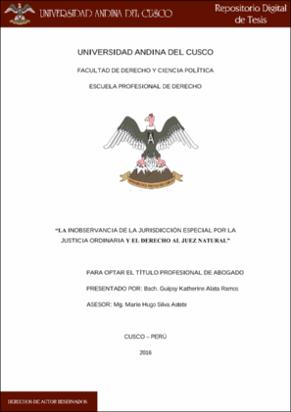| dc.contributor.advisor | Silva Astete, Mario Hugo | |
| dc.contributor.author | Alata Ramos, Guipsy Katherine | |
| dc.date.accessioned | 2017-05-25T17:56:47Z | |
| dc.date.available | 2017-05-25T17:56:47Z | |
| dc.date.issued | 2016-12-16 | |
| dc.identifier.uri | https://hdl.handle.net/20.500.12557/773 | |
| dc.description.abstract | La coordinación intercultural es un DEBER para la Jurisdicción Ordinaria, la Justicia de Paz y la Jurisdicción Especial. Ya que a través de las leyes y reglamentos esta es una obligación jurídica. De tal forma, evitar duplicidad de procedimientos y el doble juzgamiento ante sistemas de justicia diferentes. Facilitando las acciones de coordinación entre las autoridades de los diferentes sistemas de Justicia, con la finalidad la paz social y resolución de conflictos.
A pesar de existir conocimiento sobre la existencia y aplicación de la función jurisdiccional de las Comunidades Campesinas y Nativas, y Rondas Campesinas, algunos jueces penales mantienen su posición por hacer prevalecer la jurisdicción ordinaria por sobre esta. Asimismo, refieren no creer conveniente el reconocimiento pleno y legal del ejercicio de la función jurisdiccional. Durante mucho tiempo, la jurisdicción ordinaria ha prevalecido impuesta, sin embargo, es necesario que los jueces penales innoven y se dinamicen conjuntamente al estado constitucional de derecho, dejando de lado esa interpretación jurídica monista, actuando como si se le otorgara un favor a las Comunidades Campesinas y Nativas, y Rondas Campesinas al aceptar su
preexistencia y aplicación de sus derechos en sus propio sistema de justicia.
De acuerdo a los resultados obtenidos de las encuestas realizadas a los jueces penales del distrito judicial del Cusco, existe conocimiento del ejercicio y función de la jurisdicción especial reconocida a las Comunidades Campesinas y Nativas, y Rondas Campesinas, en el extremo de reconocimiento constitucional y legal. Sin embargo, la inobservancia se evidencia por el gran porcentaje de jueces que no considera el respeto por la jurisdicción especial en la práctica judicial, lo que concuerda con la opinión de expertos en asuntos interculturales, es decir, que puede existir un reconocimiento constitucional y legal, pero este no es aceptado ni incorporado con plenitud. | es_PE |
| dc.description.abstract | Intercultural coordination is a DUTY for Ordinary Jurisdiction, Justice of Peace and Special Jurisdiction. Because through laws and regulations this is a legal obligation. In such a way, avoid duplication of procedures and double judgment before different justice systems. Facilitating the coordination actions between the authorities of the different justice systems, with the aim of social peace and conflict resolution.
Although there is knowledge about the existence and application of the jurisdictional function of the Peasant and Native Communities, and Rondas Campesinas, some criminal judges maintain their position for prevailing ordinary jurisdiction over this.
Likewise, they refer not to believe the full and legal recognition of the exercise of the jurisdictional function. For a long time, ordinary jurisdiction has prevailed imposed, however, it is necessary for criminal judges to innovate and jointly stimulate the constitutional state of law, leaving aside that monistic legal interpretation, acting as if it were granted a favor to the Communities Peasants and Natives, and Peasant Rounds in accepting their pre-existence and application of their rights in their own justice system.
According to the results obtained from the surveys conducted to the criminal courts ofthe judicial district of Cusco, there is knowledge of the exercise and function of the special jurisdiction recognized to the Peasant and Native Communities, and Rondas Campesinas, at the end of constitutional and legal recognition. Nonetheless, nonobservance is evidenced by the large percentage of judges who do not consider respect for special jurisdiction in judicial practice, which is consistent with the opinion of experts on intercultural matters, that is, there may be constitutional and legal precogniion, but this is neither accepted nor fully incorporated. | en_US |
| dc.description.uri | Tesis | es_PE |
| dc.format | application/pdf | es_PE |
| dc.language.iso | spa | es_PE |
| dc.publisher | Universidad Andina del Cusco | es_PE |
| dc.rights | info:eu-repo/semantics/restrictedAccess | es_PE |
| dc.source | Universidad Andina del Cusco | es_PE |
| dc.source | Repositorio Institucional - UAC | es_PE |
| dc.subject | Jurisdicción especial | es_PE |
| dc.subject | Comunidades campesinas | es_PE |
| dc.subject | Comunidades nativas | es_PE |
| dc.subject | Rodas campesinas | es_PE |
| dc.title | La inobservancia de la jurisdicción especial por la justicia ordinaria y el derecho al juez natural. | es_PE |
| dc.type | info:eu-repo/semantics/bachelorThesis | es_PE |
| thesis.degree.name | Abogado | es_PE |
| thesis.degree.grantor | Universidad Andina del Cusco. Facultad de Derecho y Ciencia Política | es_PE |
| thesis.degree.level | Titulo Profesional | es_PE |
| thesis.degree.discipline | Derecho | es_PE |

